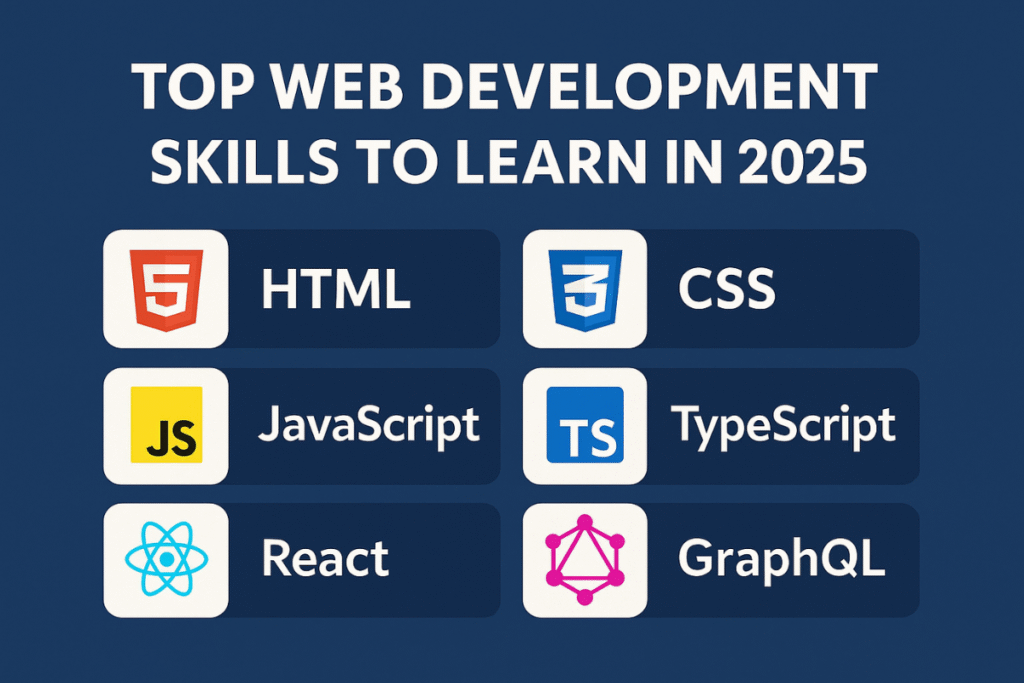The world of web development is constantly evolving. New technologies, frameworks, and trends emerge every year, reshaping the way websites and applications are built. In 2025, businesses are prioritizing speed, security, user experience, and advanced functionality, which means web developers need to adapt quickly to stay ahead.
Whether you’re a beginner stepping into coding or an experienced developer looking to sharpen your skills, focusing on the most in-demand web development skills of 2025 will help you remain competitive and open doors to high-paying opportunities.
In this blog, we’ll explore the top web development skills you should learn in 2025, why they matter, and how you can get started with each.
1. HTML, CSS, and JavaScript (Core Web Technologies)
Even in 2025, the foundation of web development hasn’t changed — HTML, CSS, and JavaScript remain the essential building blocks of the web.
-
HTML (HyperText Markup Language): Provides structure to web pages.
-
CSS (Cascading Style Sheets): Styles and designs web pages for responsiveness and aesthetics.
-
JavaScript: Adds interactivity, dynamic content, and advanced functionality.
Why Learn in 2025?
-
They are required for every front-end role.
-
Advanced frameworks (like React, Angular, or Vue) are built on top of these languages.
-
Understanding them deeply ensures you can troubleshoot, customize, and optimize websites effectively.
How to Learn:
Start with freeCodeCamp, MDN Web Docs, or Codecademy. Build small projects like portfolios, blogs, and landing pages to practice.
2. Responsive Web Design (RWD)
In 2025, mobile-first development isn’t optional — it’s the standard. With more than 60% of global web traffic coming from mobile devices, developers must master responsive web design.
Skills to Master:
-
CSS Flexbox and Grid Layout
-
Media Queries for different devices
-
Mobile-first design principles
-
Cross-browser compatibility
Why It’s Important:
-
Enhances user experience on all devices.
-
Improves SEO rankings, as Google prioritizes mobile-friendly websites.
-
Critical for e-commerce, SaaS platforms, and content-driven sites.
3. JavaScript Frameworks and Libraries
Learning a JavaScript framework is a must in 2025. They simplify complex tasks, speed up development, and provide ready-made components for interactive web apps.
Most Popular in 2025:
-
React.js (still the leader for UI development)
-
Vue.js (lightweight, flexible, and beginner-friendly)
-
Angular (great for enterprise-level apps)
-
Next.js / Nuxt.js (for server-side rendering and SEO optimization)
Why It’s Important:
-
Many companies expect developers to be proficient in at least one framework.
-
Faster, cleaner, and more scalable code.
-
High demand in job postings and freelancing projects.
4. Version Control Systems (Git & GitHub)
Collaboration is key in modern web development, and Git is the industry standard for version control. In 2025, Git is not just a “good-to-have” skill — it’s essential.
Benefits of Learning Git:
-
Track changes in your codebase.
-
Collaborate with teams efficiently.
-
Manage multiple versions of projects.
-
Showcase projects on GitHub for employers/clients.
5. Backend Development (Node.js, Python, PHP, Ruby)
Web development isn’t just about the front end — understanding the backend is crucial for becoming a full-stack developer.
Popular Backend Technologies in 2025:
-
Node.js (JavaScript runtime environment, fast and scalable)
-
Python (Django/Flask) (powerful and versatile for web apps)
-
PHP (Laravel) (still widely used for WordPress and CMS platforms)
-
Ruby on Rails (great for startups and MVPs)
Why Backend Matters:
-
Handles databases, server logic, and APIs.
-
Critical for building dynamic websites, e-commerce, and SaaS applications.
-
Full-stack developers earn higher salaries.
6. Databases (SQL & NoSQL)
Every web app needs data storage, making databases one of the most important skills.
Two Types of Databases:
-
SQL (Structured Query Language) – e.g., MySQL, PostgreSQL
-
NoSQL (Non-relational) – e.g., MongoDB, Firebase
Why Learn Databases in 2025?
-
Helps you store, query, and manage data efficiently.
-
Essential for apps like social networks, booking systems, or e-commerce.
-
NoSQL is growing due to scalability and flexibility.
7. APIs (REST & GraphQL)
Modern websites integrate with multiple services — payment gateways, social media, analytics, and more. This is possible through APIs (Application Programming Interfaces).
Skills to Learn:
-
RESTful APIs (most widely used)
-
GraphQL (increasingly popular for flexible queries)
-
Authentication (OAuth, JWT)
Why It’s Important:
-
Enables data exchange between applications.
-
Makes websites more functional and scalable.
-
Crucial for SaaS, e-commerce, and mobile app integration.
8. Web Performance Optimization
In 2025, users expect websites to load in less than 3 seconds. Speed is not only a user preference but also a ranking factor for SEO.
Key Optimization Skills:
-
Image compression and lazy loading
-
Code splitting and minification
-
Caching strategies
-
CDN (Content Delivery Network) integration
9. Cybersecurity Awareness
Cyber threats are increasing, making web security skills essential.
Areas to Focus On:
-
HTTPS and SSL Certificates
-
Secure Authentication & Password Storage
-
Preventing SQL Injection & XSS Attacks
-
Data Encryption
Why It Matters in 2025:
-
Protects user data and builds trust.
-
Businesses are legally required to follow data privacy rules (like GDPR, CCPA).
-
Security skills make you a more valuable developer.
10. DevOps and Deployment Skills
Knowing how to deploy and manage applications is a huge plus.
Tools to Master:
-
Docker & Kubernetes (for containerization)
-
CI/CD Pipelines (Continuous Integration & Deployment)
-
Cloud Platforms (AWS, Google Cloud, Azure)
-
Vercel, Netlify, DigitalOcean (simpler deployment options)
11. Web3 and Blockchain Development
The rise of decentralized applications (dApps), NFTs, and blockchain-based platforms continues in 2025. While Web3 adoption is still evolving, developers with blockchain knowledge are in demand.
Skills to Explore:
-
Smart Contracts (Solidity, Ethereum)
-
Web3.js & Ethers.js libraries
-
Decentralized storage (IPFS)
12. Artificial Intelligence (AI) and Machine Learning Integration
AI-powered websites are the future. From chatbots to personalized recommendations, web developers need to understand how to integrate AI APIs.
Key AI Skills:
-
Using APIs like OpenAI, TensorFlow.js
-
Natural Language Processing (NLP) for chatbots
-
AI-driven personalization
13. UI/UX Design Principles
Web developers don’t need to be expert designers, but knowing basic UI/UX principles is a must.
Skills to Learn:
-
Figma, Sketch, or Adobe XD for prototyping
-
Color psychology and typography
-
Accessibility (WCAG compliance)
-
Micro-interactions for better user engagement
14. Soft Skills (Collaboration, Problem-Solving, Communication)
In 2025, technical expertise alone won’t be enough. Employers also look for soft skills:
-
Communication with team members and clients.
-
Problem-solving mindset for debugging and scaling projects.
-
Adaptability to learn new frameworks quickly.
Conclusion
The web development landscape in 2025 is both challenging and rewarding. To succeed, developers must combine core technical skills (HTML, CSS, JavaScript) with modern frameworks, backend knowledge, security awareness, and emerging technologies like AI and Web3.
By continuously upgrading your skill set, practicing through real-world projects, and staying curious, you’ll not only remain relevant but also thrive in the fast-paced world of web development.
👉 Start today — pick one skill from this list, practice it daily, and watch your career grow.

